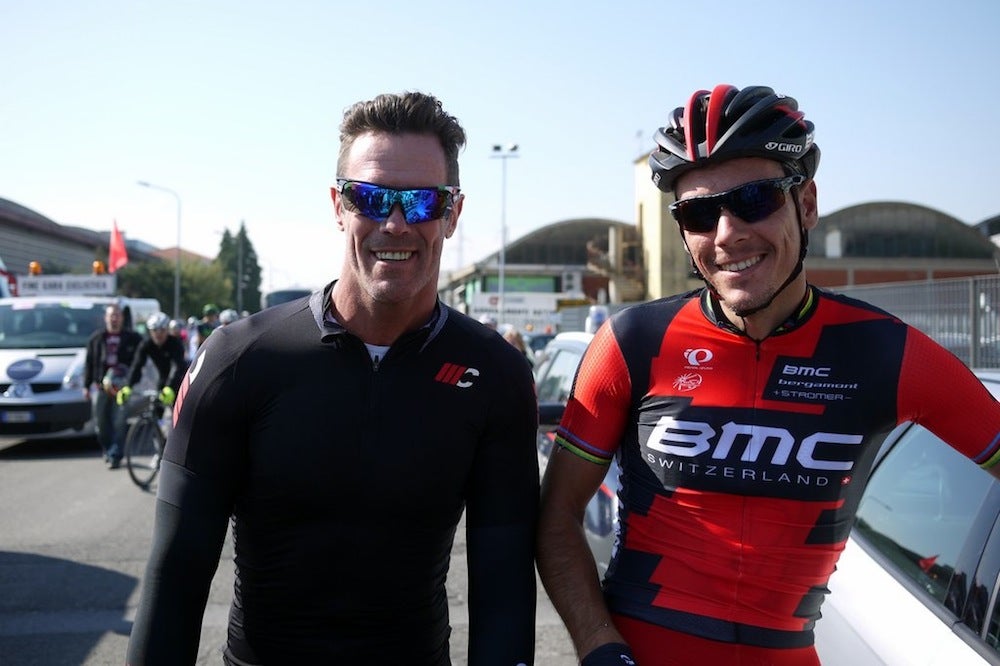Gilbert: Sanremo unpredictable, but within reach

BMC's Philippe Gilbert spoke at the start of Friday's stage in Cascina with 2002 Milano-Sanremo winner Mario Cipollini. Photo by Gregor Brown.
AREZZO, Italy (VN) — Philippe Gilbert (BMC Racing), fourth on stage 3 of Tirreno-Adriatico on Friday, remains uncertain how Milano-Sanremo will finish this year.
Race organizer RCS Sport added a new climb, La Pompeiana, and then due to road problems, was forced to cut it. And without the mid-race ascent of La Mànie, La Primavera is back to its former self: geared to the tough sprinters.
Gilbert knows how to win major one-day races. He won the 2012 world championship in Valkenburg, and all three Ardennes Classics – Amstel Gold, Flèche Wallonne and Liège-Bastogne-Liège – in 2011. At Milano-Sanremo, he has twice placed third. How he’ll fare in this year’s edition, next Sunday (March 23), remains a mystery.
“Liège-Bastogne-Liège and Flèche Wallonne have two of the hardest finals in one-day races,” Gilbert told VeloNews. “That makes it clear, when you are strong, you can go and you play for the win. That’s not the same for Sanremo or Paris-Tours or a race like those.”
Gilbert, who lives near the Sanremo course in Monaco, spent the winter training on the new Pompeiana climb, which RCS Sport had added in September. He liked the addition, and felt that it gave him a better chance to win. However, due to landslides and poor road conditions, the local provincial government would not give RCS permission to use the road.
“If Pompeiana was on the course, then other types of riders would’ve come and we would’ve had another type of race on our hands,” Gilbert continued. “It would’ve been hard to compare to what it is now. Mark Cavendish wouldn’t have come but Chris Froome and other riders would have. It would’ve been completely different. What I’ve always said, the riders make the race, and not the course. That’s always the case.
“I can be good with any option the organizer uses. I can be good with climbs or without climbs because it’s 300 kilometers of racing. It’s always hard when you cover such a distance. If it was even flat and straight, you’d still have guys dropped and have a possibility to do something.”
At the start of Friday’s Tirreno-Adriatico stage, in Cascina, Gilbert spoke with 2002 Sanremo winner Mario Cipollini. The Italian patted him on the back and wished him luck before the stage began down the Tuscan roads towards Arezzo.
“Gilbert can win Milano-Sanremo, he’s won Liège-Bastogne-Liège,” Cipollini said. “He just has to do what he does, attack on the Poggio and ‘bang’, it’s all over for the others.”
If Gilbert does not pull it off this year, he can always look towards 2015. Course director Mauro Vegni has said that he wants to reintroduce the five-kilometer Pompeiana climb in future editions. If the Pompeiana returns, Gilbert believes his chance to become the first Belgian to win since Alfons De Wolf in 1981 increases. (Those in Belgium do not count Russian-turned-Ukrainian-turned-Belgian Andrei Tchmil’s 1999 win at Sanremo.)
Gilbert, however, wants to try this year on the traditional course that takes in the Tre Capi, the Cipressa and the Poggio. He has raced this version of the course four times — in 2004, 2005, 2006, and 2007.
For support, BMC Racing will likely bring Taylor Phinney, Greg Van Avermaet, Thor Hushovd and Danilo Wyss. Wyss delivered Gilbert into Arezzo Friday where he finished fourth behind a potential Sanremo rival Peter Sagan (Cannondale). Gilbert said that Wyss was “perfect” and “exceptional” and that they often train together.
Everything bodes well regardless of Sanremo’s course. Gilbert confirmed his hopes at the finish in Arezzo, saying, “This performance gives me a lot of confidence.” And with his kick today in Arezzo’s ancient streets, Gilbert appears to be heading down the right path to match De Wolf.